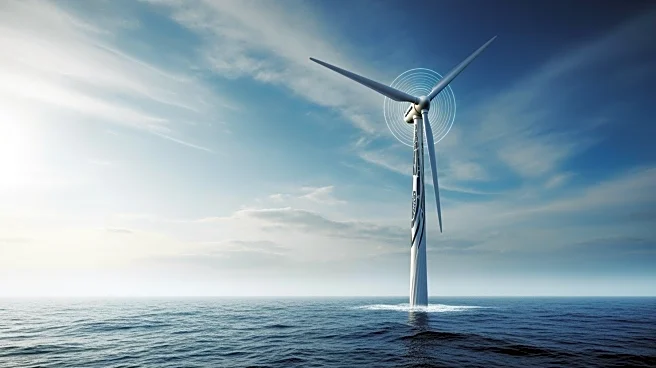What's Happening?
Orsted, a leading offshore wind company, is navigating challenges in the global market while maintaining optimism about the European sector. During a third-quarter earnings call, CEO Rasmus Errboe expressed confidence in Europe's offshore wind prospects,
despite regulatory setbacks in the U.S. and high tariffs. Orsted is focusing on maturing its project pipeline, forming partnerships, and competing in tenders, particularly in the UK, Netherlands, and Germany. The company has taken significant steps to stabilize its finances, including laying off 2,000 employees, raising $9 billion through a rights issue, and selling part of its Hornsea 3 project. These actions aim to prevent a credit downgrade and maintain investor confidence.
Why It's Important?
Orsted's strategic decisions are crucial as they reflect broader trends in the offshore wind industry, particularly in the U.S. where regulatory challenges and tariffs pose significant hurdles. The company's focus on Europe highlights a shift in investment priorities, potentially affecting U.S. market dynamics and future project developments. The financial maneuvers undertaken by Orsted could influence investor behavior and market stability, impacting stakeholders in the renewable energy sector. The company's actions may also set a precedent for other firms facing similar challenges, shaping industry strategies and competitive landscapes.
What's Next?
Orsted plans to continue its strategic focus on Europe, with expected leasing activities in key markets from 2027 onwards. The company aims to deliver on its strategy quarter by quarter, ruling out potential mergers with Equinor's offshore wind division. This decision underscores Orsted's commitment to its current plans and could influence future market collaborations and competitive dynamics. Stakeholders will be watching how Orsted's financial strategies and market focus evolve, particularly in response to ongoing U.S. regulatory challenges.
Beyond the Headlines
The developments at Orsted highlight the complex interplay between regulatory environments, financial strategies, and market dynamics in the renewable energy sector. The company's actions may prompt discussions on the sustainability of offshore wind investments and the role of government policies in shaping industry growth. Additionally, Orsted's focus on Europe could lead to shifts in global energy investment patterns, influencing long-term industry trends and environmental impacts.

















